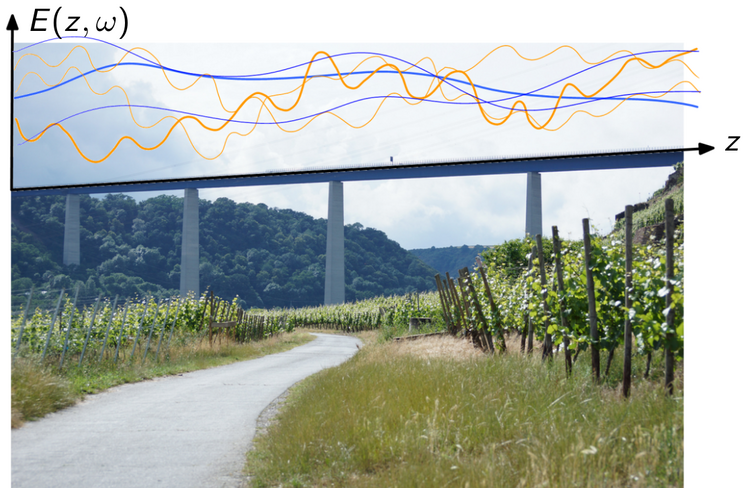Imprecise random fields within non-linear finite element analysis

| Leitung: | Udo Nackenhorst (former also Amélie Fau) |
| Team: | Mona Madlen Dannert (former also Rodolfo Fleury) |
| Jahr: | 2016 |
| Förderung: | Priority Programme SPP 1886 of German Research Foundation (DFG), State of Lower Saxony |
Regarding climate change, nowadays research focus lays more and more on sustainability and resource saving approaches. Quantifying and considering uncertainties within the engineering design process can help to reduce both, ecological and economical costs. Instead of conservative safety and knockdown factors, a stochastic finite element (FE) analysis enables an optimized design. For this purpose, input variables such as material or load properties can be considered uncertain. This can involve aleatory as well as epistemic uncertainties. The first describes an intrinsic randomness of a parameter, e.g. in terms of random variables or random fields, and can be considered by stochastic theory. The latter characterizes a lack of knowledge or data that can be modelled by possibilistic approaches such as interval or fuzzy analysis.
Mixed aleatory and epistemic uncertain, spatially varying input parameters can be considered in terms of imprecise random fields. In this project they originate from interval valued parameters within the Karhunen-Loève (KL) expansion of a random field. A contemplable parameter to add epistemic uncertainty to a classically epistemic uncertain random field is given by the correlation length. This material parameter describes the correlation of the values at two arbitrary locations depending on their distance and can hardly be measured. Describing the correlation length as an interval therefore seems natural. Imprecise random fields can be propagated by a probability box (p-box) approach, where the epistemic uncertainties are discretised in an outer loop. For each resulting epistemic value, the resulting random field is discretised by KL expansion and sampled within an inner loop.
Propagating imprecise random fields efficiently and accurately through a FE model can become quite challenging. Depending on the correlation length the stochastic space of a random field parameter discretised by KL expansion can quickly become high-dimensional. Considering additionally non-linear FE problems, e.g. in terms of non-linear material laws, sophisticated sampling methods such as stochastic collocation or sparse polynomial expansion approaches turn out to be limited. On the other hand, a brute force Monte Carlo sampling is always applicable but computationally too expensive to be applied for real engineering problems. For that reason, the effect of (several) imprecise random field input parameters is investigated carefully next to simple random variable input parameters. Aim is to avoid high-dimensional simulations where a low-dimensional description by random variables is sufficient. Furthermore, the characteristics of the input random field convergence behaviour is exploited to estimate the stochastic response of a quantity of interest by interpolation from the response obtained by a random variable simulation.
Follow-Up Links
- Priority Programme SPP 1886
- German Research Foundation DFG
- Dannert et al. 2021: Limit Representations of Imprecise Random Fields


